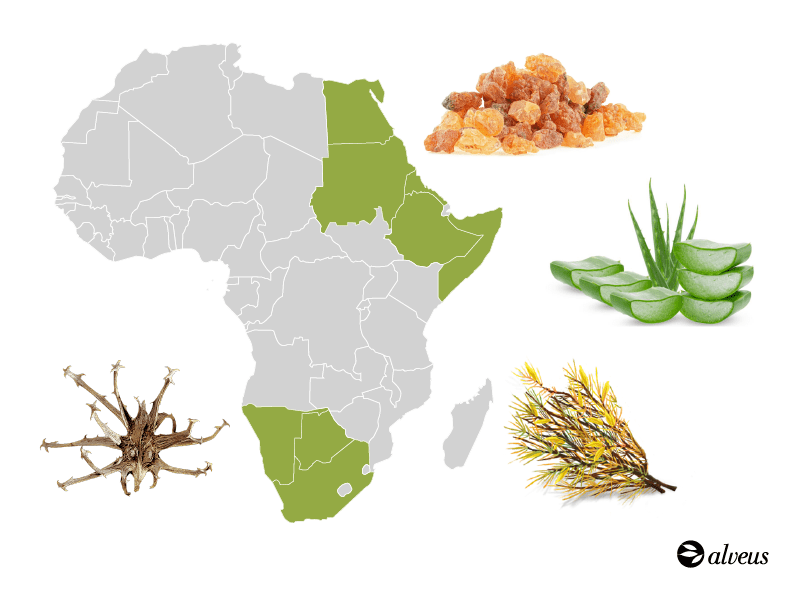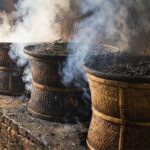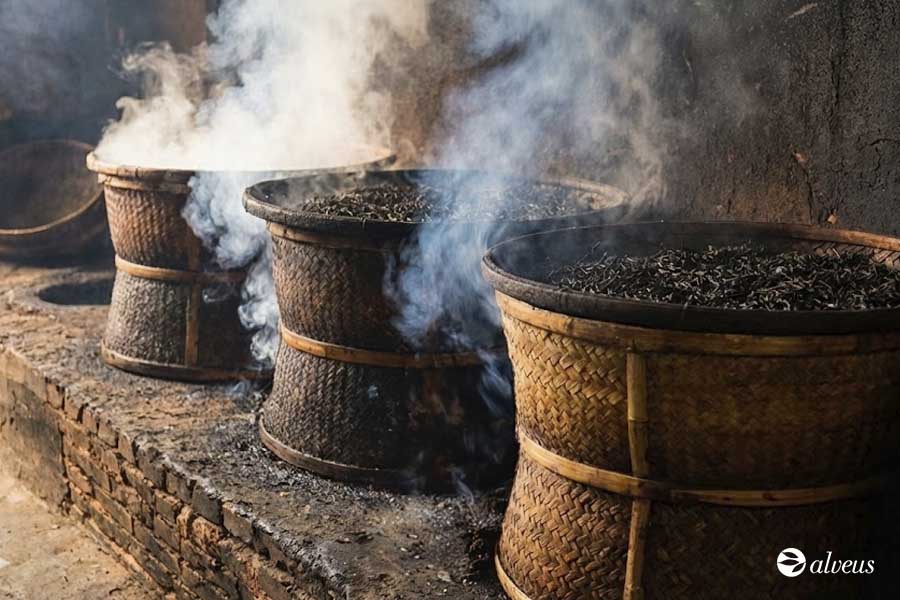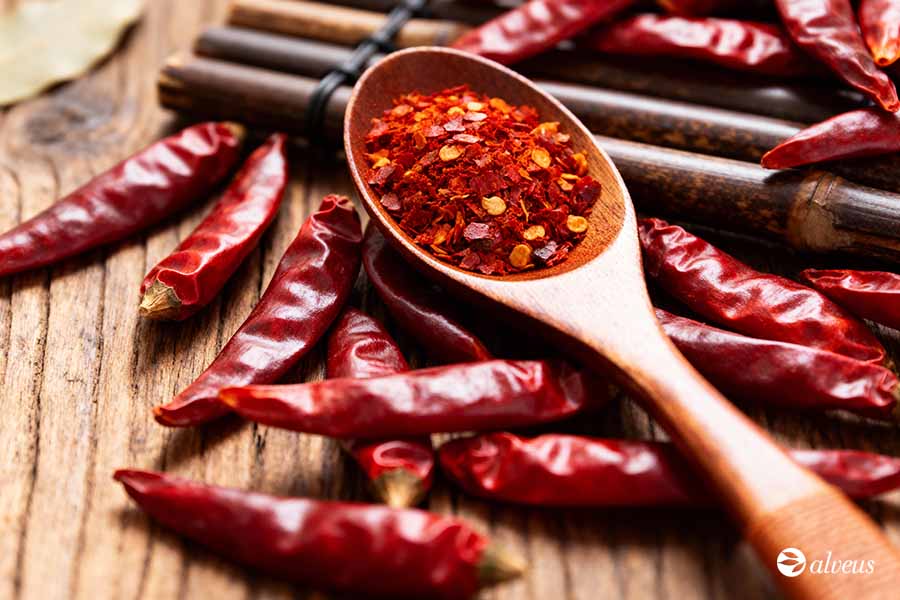Heilpflanzen aus Afrika sind nur eines vieler Beispiele dafür, dass dieser Kontinent eine der größten Artenvielfalten der Welt beherbergt.
Seit Tausenden von Jahren nutzen die Völker Afrikas Kräuter für die Behandlung von Krankheiten und verbinden dabei Erfahrungswerte, spirituelle Überzeugungen und eine tiefe Verbundenheit mit der Natur. Dieses uralte Wissen ist nicht nur für die traditionelle afrikanische Medizin von zentraler Bedeutung, sondern hat auch medizinische Systeme in anderen Kulturen beeinflusst.
Auch heute noch ist die afrikanische Kräuterkunde ein Gebiet von wachsendem Interesse für die moderne Wissenschaft, die ihre Anwendungen und Wirkstoffe aus einer neuen Perspektive untersucht.
Ursprünge und Entwicklung der afrikanischen Naturmedizin
Seit jeher haben sich die Menschen auf die Pflanzen in ihrer Umgebung verlassen, um ihre Gesundheit zu fördern. Dieses Wissen wurde mündlich überliefert, wobei sich Erfahungswerte mit spirituellen Überzeugungen vermischten.
In vielen afrikanischen Kulturen geht es bei der Heilung nicht nur um die Linderung eines Symptoms, sondern auch um die Wiederherstellung des Gleichgewichts zwischen Körper, Seele und Natur.
Eine der ältesten Aufzeichnungen über die Verwendung von Kräutern in Afrika ist der Papyrus von Ebers (1500 v. Chr.), in dem Pflanzen wie Aloe und Myrrhe erwähnt werden.
Ab dem 8. Jahrhundert, mit der Ausbreitung des Islam, hatte das arabische medizinische Wissen einen bedeutenden Einfluss auf Nord- und Westafrika. Ärzte und Botaniker wie Avicenna und Ibn al-Baitar sammelten, systematisierten und verbreiteten die Verwendung vieler Heilpflanzen.
Diese Beeinflussung ersetzte die lokale Tradition nicht, sondern ergänzte sie und führte zu einer stärker strukturierten, hybriden Medizin, die sich noch heute in den Märkten, Handschriften und Praktiken vieler afrikanischer Gemeinschaften widerspiegelt.
Spirituelle und kulturelle Dimension der traditionellen afrikanischen Medizin
In vielen abgelegenen Gebieten Afrikas, wie bei den Berbern in Marokko, ist die Kräutermedizin eng mit dem spirituellen Glauben verbunden.
In diesen Kulturen glaubt man, dass Krankheiten durch Geister – bekannt als Dschinn – verursacht werden können, die von Menschen Besitz ergreifen. Zur Heilung werden Kräuter mit „magischen“ Eigenschaften verwendet und Rituale durchgeführt, um das Gleichgewicht zwischen Körper und Geist wiederherzustellen.
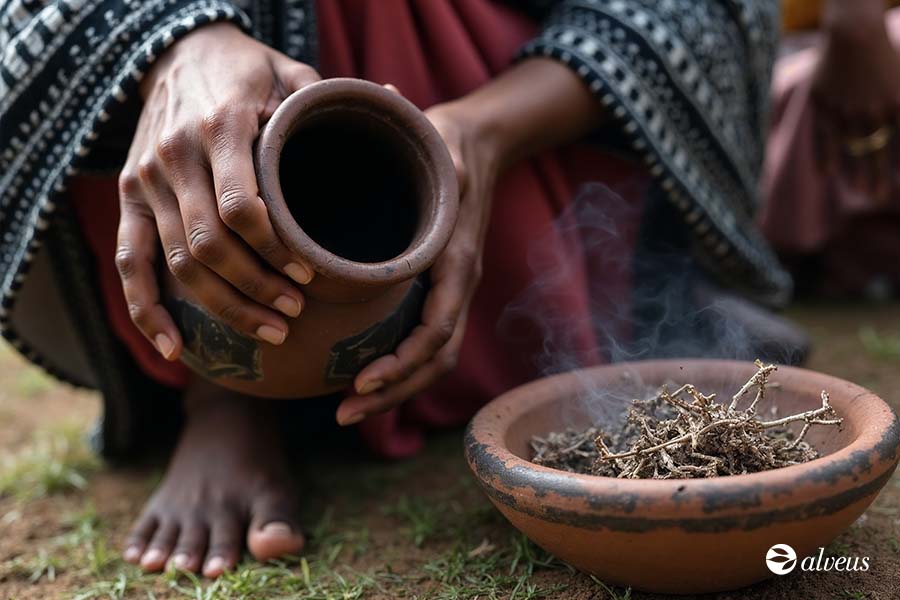
Trotz der Fortschritte der modernen Medizin nutzen viele afrikanische Völker weiterhin das traditionelle Wissen über die Verwendung einheimischer Pflanzen. Afrikanische Heilpflanzen werden nicht nur zur Behandlung körperlicher Beschwerden verwendet, sondern sind auch Bestandteil spiritueller und zeremonieller Praktiken.
Von der Tradition zur Wissenschaft: Integration und Anerkennung
Die Pflanzenheilkunde ist trotz der Fortschritte der modernen Medizin in vielen Regionen Afrikas nach wie vor unverzichtbar, insbesondere in ländlichen Gebieten mit begrenztem Zugang zu Krankenhäusern und Medikamenten.
In Ländern wie Ghana und Südafrika wurden Programme zur Integration von traditioneller und konventioneller Medizin gefördert, um eine sichere und geregelte Verwendung pflanzlicher Heilmittel zu erreichen.
Viele traditionelle Heilmittel sind inzwischen wissenschaftlich anerkannt. Die Afrikanische Pflaume und die Teufelskralle sind Beispiele für afrikanische Pflanzen, deren therapeutisches Potenzial in Studien erforscht wurde.
Dieser Ansatz fördert den Dialog zwischen Volksweisheit und moderner Wissenschaft und macht die Validierung von überlieferten Heilmitteln möglich.
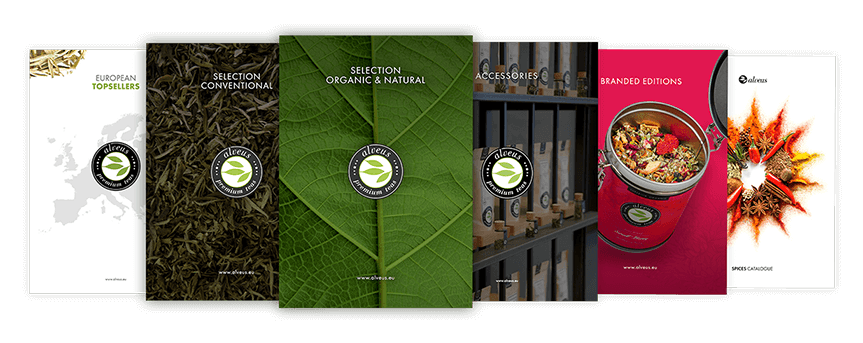
Die wichtigsten afrikanischen Heilpflanzen
Afrika beherbergt eine große Vielfalt an Pflanzen, denen therapeutische Eigenschaften zugeschrieben werden. Einige der bekanntesten und am besten untersuchten sind:
- Afrikanische Pflaume: Dieser Baum wurde auf seine mögliche Anwendung bei bestimmten Prostatabeschwerden untersucht. Sein Extrakt wird in Europa und Amerika als Nahrungsergänzungsmittel vermarktet.
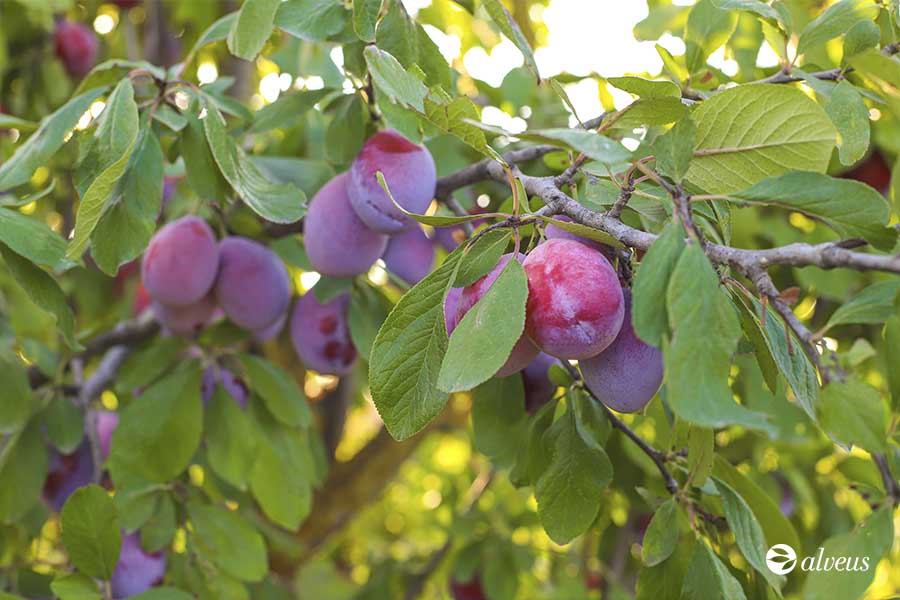
- Aloe Vera: Diese in Nord- und Ostafrika weit verbreitete Pflanze wird häufig zur Behandlung von Haut- und Verdauungsproblemen eingesetzt und ist in der Kosmetikindustrie weit verbreitet.
- Teufelskralle: Eine in der Kalahari-Wüste heimische Heilpflanze, die für ihre entzündungshemmende und schmerzlindernde Wirkung bekannt ist. Sie wird häufig zur Behandlung von Gelenk- und Muskelschmerzen eingesetzt.
- Myrrhe: Ihr wird eine antimikrobielle und heilende Wirkung zugeschrieben. Myrrhe wird seit Jahrhunderten zur Desinfektion von Wunden und zur Behandlung von Mundinfektionen verwendet.
- Hoodia: Diese Pflanze, die traditionell von den Völkern der Kalahari-Wüste zur Appetitzügelung verwendet wird, wurde auf ihre hungerstillenden Eigenschaften hin untersucht.
- Rooibos: Der ursprünglich aus Südafrika stammende Strauch ist für seine antioxidativen und verdauungsfördernden Eigenschaften bekannt und als Tee sehr beliebt.
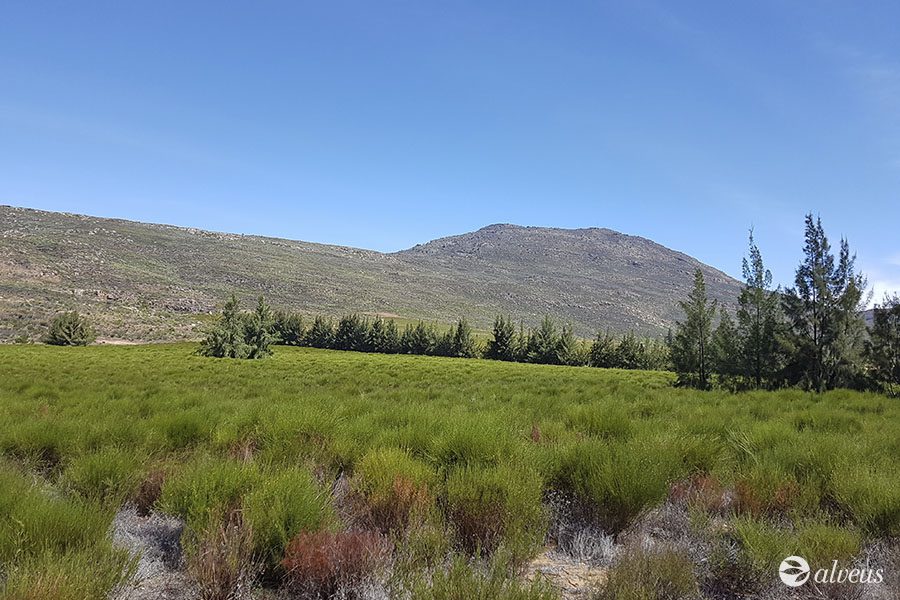
Afrikanische Heilkräuter: Herausforderungen und Chancen
Trotz ihres enormen therapeutischen und kulturellen Wertes stehen die afrikanischen Heilpflanzen vor großen Herausforderungen.
- Die übermäßige Ausbeutung einiger Arten gefährdet deren Nachhaltigkeit, insbesondere angesichts der steigenden Nachfrage. In diesem Fall ist die Förderung nachhaltiger Anbaumethoden unerlässlich.
- Weiterhin mangelt es in vielen Ländern immer noch an Vorschriften und Qualitätskontrollen für das Inverkehrbringen von pflanzlichen Arzneimitteln, was ihre sichere Verwendung beeinträchtigt.
Gleichzeitig bieten sich auch große Chancen, wie zum Beispiel:
- Die weltweit wachsende Nachfrage nach Naturprodukten belebt den Markt für afrikanische Kräuter und öffnet die Tür für neue Initiativen zum nachhaltigen Anbau und zur Bestandserhaltung.
- Die wissenschaftliche Forschung entdeckt immer wieder neue Wirkstoffe in diesen Pflanzen, die die Entwicklung künftiger Arzneimittel und Wellnessprodukte auf deren Basis vorantreiben könnten.
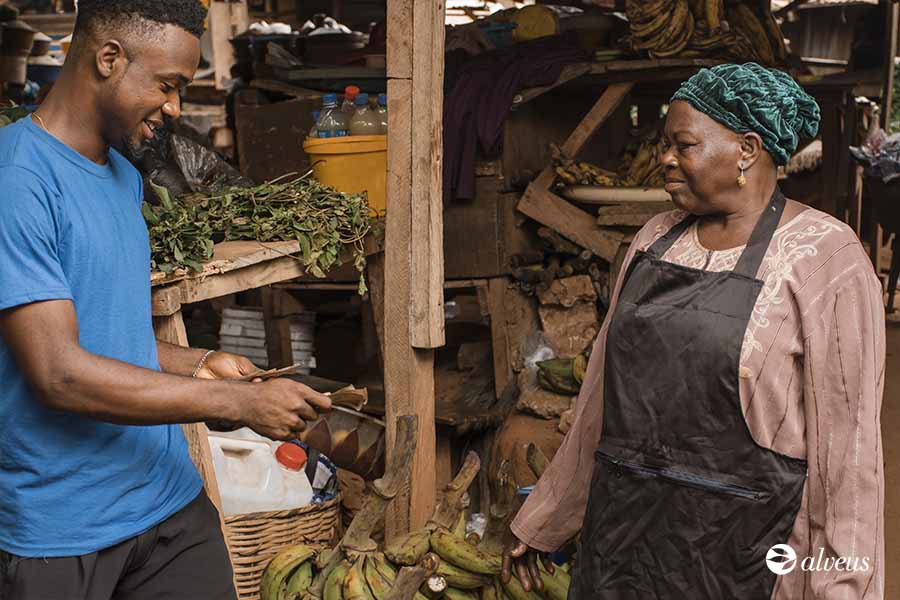
Die globale Reichweite der afrikanischen Heilpflanzen
Die afrikanische Naturmedizin weist eine enge Verbindung von Mensch und Umwelt auf, die durch jahrhundertelange Beobachtung, Praxis und Glaubenswerte entstanden ist. Ihre Tradition hat im Laufe der Zeit nicht nur die Gesundheit von Millionen von Menschen beeinflusst, sondern auch das Interesse der modernen Wissenschaft für ihr therapeutisches Potenzial geweckt.
In einem globalen Kontext, in dem das Natürliche und Nachhaltige immer mehr an Bedeutung gewinnt, stellen diese afrikanischen Heilpflanzen eine Quelle der Inspiration und des Studiums dar, sowohl in kultureller als auch in wissenschaftlicher Hinsicht.
Diese Traditionen anzuerkennen bedeutet nicht, ihre medizinische Gültigkeit ohne Beweise anzunehmen, sondern ihre Bedeutung zu würdigen und den Weg dafür zu öffnen, dass Volkskunde und Wissenschaft Hand in Hand arbeiten, um neue Möglichkeiten für Gesundheit und Wohlbefinden zu erkunden.


